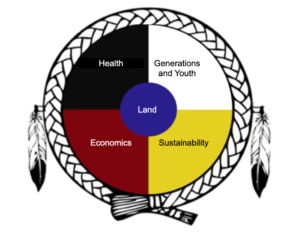Written by: Aneesa Khan
Edited by: Harnoor Kaur Chahal
Designed by: Suhana Shaik
Published by: Andrew Jackson
“Food will be what brings the people together,” Secwepemc Elder, Jones Ignace, once said.
Since the time of colonization, Indigenous communities have witnessed a drastic decline in the health and integrity of Indigenous cultures, ecosystems, social structures, and knowledge systems, which are integral to our ability to respond to our own needs for adequate amounts of healthy Indigenous foods. Indigenous food sovereignty is a framework for health and community development and reconciling past social and environmental injustices in an approach that people of all cultures can relate to.
The food systems of Indigenous people contain extensive knowledge that is unfortunately often both undocumented and underutilized in contemporary society, which has increasingly poor nutrition and a loss of food biodiversity. Indigenous Peoples in all global regions are among the most vulnerable to marginalization, food insecurity, and chronic disease, and will benefit greatly from strengthening their resource-rich food systems to make them more resilient and sustainable.
These food systems have the potential to sustain biocultural knowledge, resilience, and sustainability. However, these internationally recognized and outstanding attributes, historically documented in part, are threatenedby the many challenges of globalization that could lead to their loss and eventual disappearance. With the advent of the 2021 United Nations Food Systems Summit and recent policies that encourage sustainability, we highlight the need to address Indigenous Peoples’ food system loss, and how communities can proceed to strengthen the continuity and sustainability of their cultural food systems.
In contrast to the highly mechanistic, linear food production, distribution, and consumption model applied in the industrialized food system, an Indigenous food system is one that has been primarily cultivated, taken care of, harvested, prepared, preserved, shared, or traded within the boundaries of our respective territories based on values of interdependency, respect, and ecological sensibility. As the most intimate way in which Indigenous peoples interact with our environment, Indigenous food systems are in turn maintained through our active participation in traditional land and food systems.
The Medicine Wheel, pictured below, makes up the foundation of what these food systems are based on. Through further learning about Indigenous practices when it comes to sustainability, we can achieve a better and healthier planet for all.

Works Cited
- Indigenous Food Systems Network | Indigenous Food Systems Network, https://www.indigenousfoodsystems.org/. Accessed 17 June 2025.
- Sibanda, Simbarashe, and Phyllis Ohene. “Why and How to Strengthen Indigenous Peoples’ Food Systems With Examples From Two Unique Indigenous Communities.” Frontiers, 2 May 2022, https://www.frontiersin.org/journals/sustainable-food-systems/articles/10.3389/fsufs.2022.808670/full. Accessed 17 June 2025.

